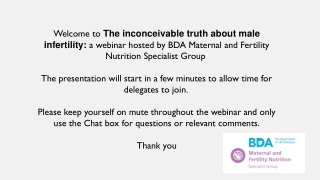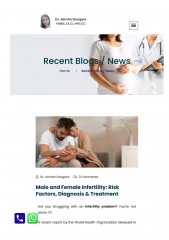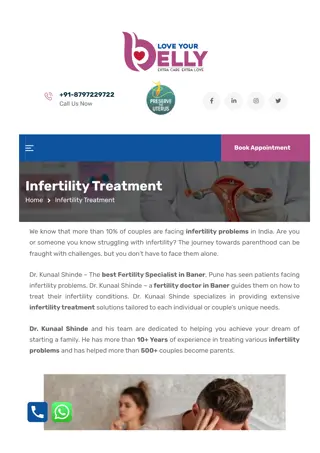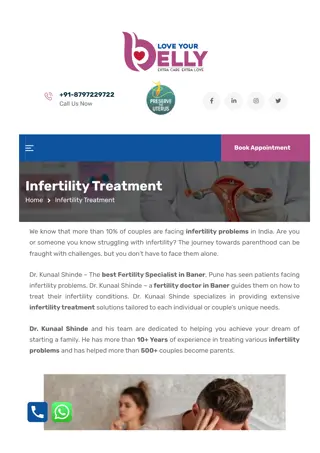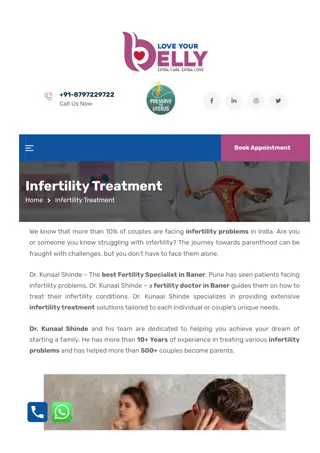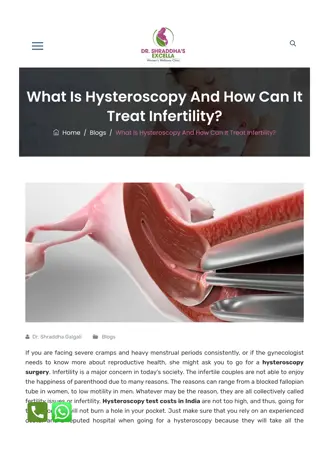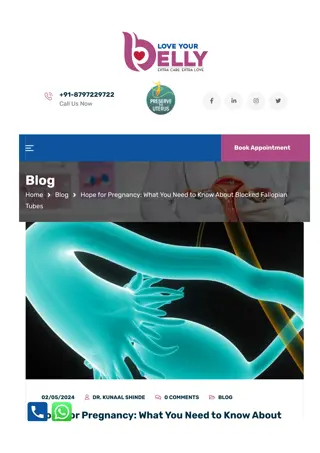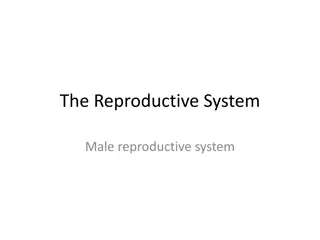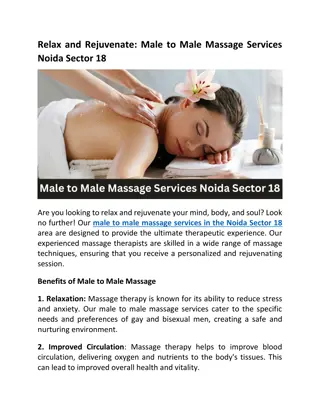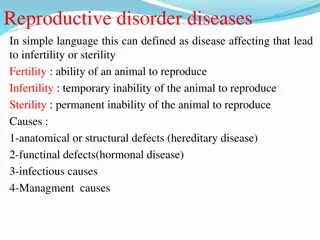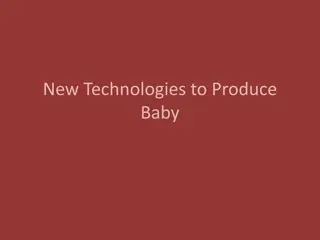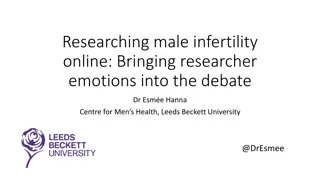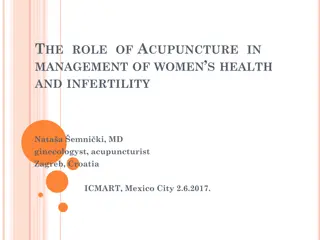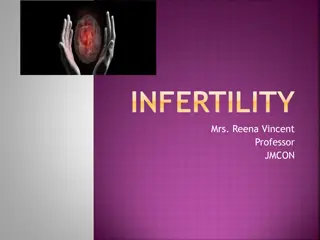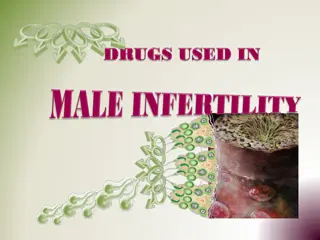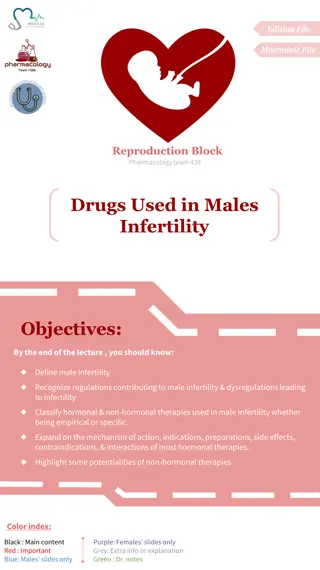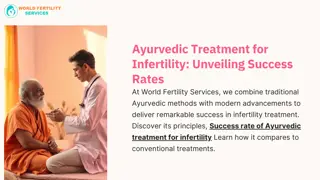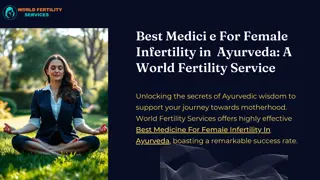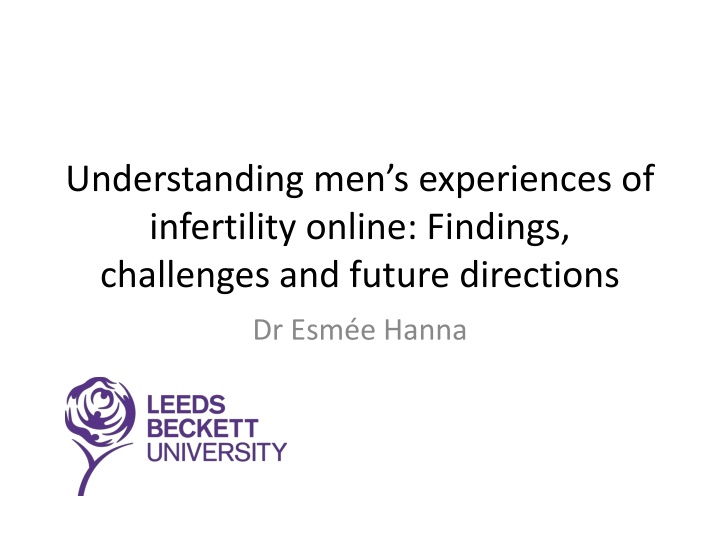
Understanding Men's Experiences of Infertility Online: Insights and Challenges
Delve into the realm of male infertility research, exploring the psychosocial dimensions and the need to amplify men's voices in the discourse. This study sheds light on how men navigate infertility, seek support, and communicate emotions in online forums.
Download Presentation

Please find below an Image/Link to download the presentation.
The content on the website is provided AS IS for your information and personal use only. It may not be sold, licensed, or shared on other websites without obtaining consent from the author. If you encounter any issues during the download, it is possible that the publisher has removed the file from their server.
You are allowed to download the files provided on this website for personal or commercial use, subject to the condition that they are used lawfully. All files are the property of their respective owners.
The content on the website is provided AS IS for your information and personal use only. It may not be sold, licensed, or shared on other websites without obtaining consent from the author.
E N D
Presentation Transcript
Understanding mens experiences of infertility online: Findings, challenges and future directions Dr Esm e Hanna
Background Research around male infertility emerged out from my previous/current research into fatherhood and men s experiences in this domain, and my co-authors work around men and online spaces and our joint interest in mental wellbeing Project is probably best understood as a Psychosocial understanding of male infertility in that we draw from both psychology and sociology We initially conducted a literature view around male infertility (Hanna & Gough, 2015) which identified 5 key areas for potential research agendas This project was therefore an exploratory piece of work into the domain of male infertility Research was positioned as broadly feminist in standpoint, seeing gender equity tied to the dismantling of reproduction as solely a site of women s labour
The research landscape Men routinely absent from discussions around fertility and marginalised in reproductive realm (Culley, Hudson and Lohan, 2013; Lohan, 2015) both within research and social life more broadly (although tide turning presently?) Know that delayed conception can be troubling for both men and women (Shirani & Henwood, 2011) in terms of temporal horizons being disrupted, but we know less about how this is experienced and managed by men Infertility research that includes men is less common although some does exist (e.g. Barnes, 2014, c.f. Hanna & Gough, 2015), often may involve couples interviews (e.g. Throsby & Gill, 2004) or be conducted in clinical settings Men s voices are therefore less readily available in our understandings of infertility and this research seeks to add men s voices as mediated through online settings to the wider reproductive research agenda
Core research questions Research sought to examine how men seek help and express emotions around infertility The research question was focused specifically around how men were talking to other men around these issues Thus the chosen research setting was the context of an online men only infertility forum The research question was deliberately left open to allow for the work to be exploratory given the limited knowledge within this area
Methodology (1) Was some precedence around online forums and male infertility (i.e. Malik and Coulson, 2008) but this showed that online spaces still required further examination Online spaces are used in relation to a variety of other men s health topics, such as depression (Gough, 2015), male grooming (Hall, 2015), eating disorders (Day & Keys, 2008; Flynn & Stana, 2012) Such spaces are viewed as a useful means for accessing men where they are, and as offering naturalistic access which may not be otherwise available (Kozinets, 2002; Langer & Beckman, 2005)
Methodology (2) Ethics need careful consideration around online research, although precedence and guidance is now being established (e.g. BPS guidelines for researching online) Once the forum was identified, threads were initially screened on title for inclusion using relevant key words Inclusion criteria kept broad, and a total of 13 thread, with 415 posts from 20 posters were ultimately included Data was analysed using thematic analysis following the method set out by Braun & Clarke, 2006 Two papers were written from the project, one around help seeking (how do men seek help online for infertility), the other around emotions (how do men emote infertility online)
Emoting Infertility (1) We found three major aspects around how men emote infertility: 1. Infertility experience as emotional rollercoaster (highs and lows, vast fluctuations, seen as site of trauma and struggle) I wish all of you who are going through IVF the very best of luck. It has been the biggest rollercoaster of my life and I wouldn t wish this on anyone (FP5) 1. Infertility as tyrannical (Infertility as all consuming, overwhelming and something which men are powerless within) It s so difficult to remain positive when life is so much on hold (FP9)
Emoting Infertility (2) 3. Infertility paranoia (infertility is powerful and its emotional impacts run beyond treatment, conception is not the joy envisioned but a new source of anguish and what could go wrong ; notion of a normal v an infertility pregnancy highlights this) Infertility robs you of so much and here I add another score it robs you of the joy every couple in the world should have when they get a positive test. How can you possibly feel joy after so much consistent disappointment? (FP2)
Help seeking for infertility (1) 4 major themes from the research in relation to help seeking: 1. Value of insider male support (Men appreciated and actively sort out advice from other men, and particularly wanted to talk to others who got it ) 2. Questions around safety of sharing online (Way that sharing occurred was framed so as to try and normalise help seeking or to seek reassurance for help seeking)
Help seeking for infertility (2) 3. Men s use of language to seek help (posts were often carefully crafted and emotions were discussed in relation to stress and getting things off your chest , and advice was honest ) 4. Shadow of hegemonic masculinity underpinning help seeking (men narrated as being private, women stereotyped as talkers and reinforcement of men not needing help occurred when talking about other professionals)
Blokes find it hard to talk and frankly usually don t want to, so is it so surprising that the ladies (who often have talking to spare) tend to speak for them in doing so, take the spotlight? (FP2) hopefully we can help if there s anything that you want to get off your chest. (FP8) Men s voices from the forum I have been feeling pretty down about the whole thing and really wanted to find somewhere to chat with other people who had been through it all as you do end up feeling like there isn t anyone you can talk to. (FP1) I m quite a private person (you may laugh as I am telling you all my thoughts and life story on here but its anonymous). (FP5)
Men experience infertility as an emotional experience Men thus expressed infertility as being a distressing experience and displayed strong emotions to this end within the forum space This runs counter to hegemonic notions of masculinity in which men are viewed as being controlled and emotionally restrained Thus men on the forum did not appear alexithymic and the data can be seen as a challenge for the idea that men view emoting as a feminised practice However, the shadow of masculinity in terms of framing the sharing of emotions and help seeking often existed on the forum, such as through the language used or recourse to humour
Men need support for infertility The data then showed infertility as an all consuming experience, and the idea that men are less bothered by infertility compared to women appeared untrue, and men narrated infertility similarly to women (idea of infertility treatment as a job Stueber & Soloman, 2008) Men felt isolated from friends and family, and often had no one to share their distress with, usual recourse to intimate partner was not always appropriate as both were distressed The forum then provided a useful space for them to share and seek help from others, and that the forum was all men with lived experience was seen as crucial
The forum as a community of practice Forums can then become a community of practice (Paetchter, 2003) in that it provides safe space which is contextual (i.e around infertility) (c.f. Robertson et al., 2015) The forum was thus a space in which being emotional was ok and men were often accessing it and posting to seek specific emotional support or reassurance about various aspects Part of the value of this may be around the anonymity that the forum space affords, helps solidify the safety and may feel less exposing than face-to-face or IRL interactions
The value of forums Forums thus enable men to share in new ways with one another and to enable support to be mobilised which feels appropriate to them new forms of emotional intimacy, sharing and meaning are beginning to open up as a consequence of these technological developments. The computer network provides opportunities for people to get together with considerable personal intimacy and proximity without the physical limitations of geography, time zones, or conspicuous social status (Williams, 1998: 124) Can then post anytime, free of identify constraints, and have ready access to peers However- was frustration around number of viewers versus posters, thus lurkers exist and posters were often irritated that they would not post, however value to reading and passive engagement was viewed which did help men with that aspect
The caveats Forums not for everyone however, and access and assumptions about availability of online resources should be tempered, particularly in relation to classed/SES understandings of technology Also, we still know very little (relatively about men and infertility) so face-to-face support groups might have same or better mechanisms for sharing/support but body of work lacks evidence and understanding Also cant generalise from forum, small context, subjective experience of those men, BUT does show potential in terms of helping men manage the distress of infertility and for us as researchers understanding it
Value of online research for infertility Being able to illuminate men s own accounts of the infertility experience, and to use their own words is very valuable Can help us to add to body of understanding around male infertility which is part of wider project that needs to occur around re-balancing the reproductive realm so that female burden, male exclusion can be equitized Being able to bring men in to reproductive realm offers the potential of being able to understand better how to support men, which in turn may help supporting women
Value of online research for infertility (2) Pragmatically online spaces allow naturalistic access that would be unavailable via other methods or approaches Being able to see how peers engage with each other would be challenging offline and the researcher constraint around personal/sensitive topic can be overcome via this approach Thus online research is not only choice, but in digital society it can be a useful way in to a topic such as this and helps move qualitative understandings of fertility beyond clinical confines
Conclusions Forums can engender support for men around the distress of infertility which they perceive as valuable Emotional experience of infertility can be traumatic and long lasting for men Being able to seek help and advice from peers with lived experience is seen as valuable to men Forums are therefore possibly way for men to support one another during infertility, but need to be considered as part of range of support for men in order to avoid essentialist ideas about who men are
Future directions? Already conducting future work around infertility online Exploring how lifestyle factors are discussed in an online setting (but in the context of a forum where both men and women are posting) Need to understand more about differences between men and women s communication styles online around infertility Cross comparative forum work would help us understand more around typicality of sharing/help seeking and emotion online by men More work needed around stigma and masculinity and any impact this has on men in relation to their wellbeing and help seeking behaviours
Thank you! e.s.hanna@leedsbeckett.ac.uk Twitter: @DrEsmee Blog: dresmee.wordpress.com
References for our papers Hanna, E and Gough, B. (2016). Emoting infertility online: A qualitative analysis of men s forum posts. Health. DOI:10.1177/1363459316649765 Hanna, E and Gough, B. (2016). Searching for help online: An analysis of peer-to-peer posts on a male-only infertility forum. Journal of Health Psychology. DOI: 10.1177/1359105316644038 Hanna, E and Gough, B. (2015). Experiencing Male Infertility: A Review of the Qualitative Research Literature. Sage Open. DOI: 10.1177/2158244015610319

